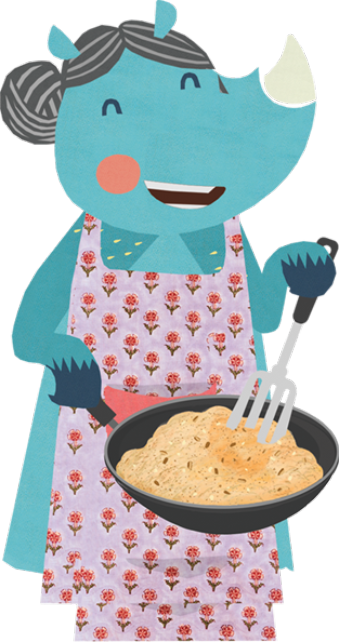Protein is one of the three macronutrients, the other two being fat and carbohydrates.
Amino acids are the building blocks of protein. Certain amino acids are not made by the body naturally. Introducing protein-rich foods can help babies get the nutrients they need.
Why Is Protein Essential for Your Baby?
1) Protein is essential for your baby’s growth and development.
2) It helps build and repair tissues, including muscles, organs, and bones.
3) It plays a role in the production of enzymes and hormones.
4) It can help regulate blood sugar levels and contribute to a healthy immune system.
TIP: At this age, babies require more fat than protein, because breast milk and infant formula are already good sources of protein.
You can start giving protein-rich foods from 6 months onwards. Start these foods early on, as a lot of these foods are rich in iron as well. Delaying the introduction of protein-rich foods may deprive babies of essential nutrients like iron and protein.
Types of Proteins
|
Protein from animal sources |
Protein from plant sources |
|
Contains all nine essential amino acids in consistent amounts. |
May lack some of the essential amino acids. |
|
Majority of complete proteins are from animal-based foods |
beans, nuts, seeds, spinach, and cauliflower. |
|
Sources: dairy, eggs, fish, and meat. Also found in quinoa and soy |
Sources: beans, lentils, whole grains, nuts, and seeds |
|
TIP: Combine plant-based protein sources to create a complete protein. E.g. Combine rice and beans or peanut butter on whole grain bread. |



However, by combining different plant-based protein sources, it is possible to create a complete protein. For example, combining rice and beans or peanut butter on whole grain bread can provide all of the essential amino acids.
Top Food Sources of Protein
Good-quality protein is found in:

|
Animal protein |
Dairy protein |
Plant protein |
|
Eggs (preferably organic) |
Milk and milk products - curd, paneer, cheese, etc. |
Pulses, whole grains, and legumes |
|
Mutton, chicken, fish, (preferably organic) |
Firm tofu |
Nuts and seeds |
Many sources of high-quality protein also provide nutrients like vitamin E, B, zinc, iron, and magnesium.
Meet Your Baby’s Protein Goals: Our Top 3 Tips

1. Include one protein-rich food in every meal. For e.g., egg for breakfast; dal/lentils and curd or yogurt for lunch; some kind of meat for dinner.

2. Add bone broth or dal water to cook the vegetables or make curries or gravies, which will add protein to the dish.

3. Power up protein during snack time. Add cheese; spread some nut butter, yogurt, or hummus; or simply offer yogurt or curd with nut butters added into it.
Protein-Rich Finger Foods Your Baby Will Enjoy

Now that we’ve looked at Fat & Protein, let’s move to the third macro nutrient: Carbs or carbohydrates.
Carbs are the energy that fuels our bodies, and babies need plenty of energy!
Often, the word “carbohydrates” brings up visuals of pasta, potatoes, and rice. In addition to these, there are other foods that contain “more healthy” carbs, like legumes, grains, and even fruit and vegetables. On the other hand, we want to avoid processed carbs with very less nutritional value like biscuits and cakes.
Why Does Your Baby Need Carbs?
|
DID YOU KNOW: “Whole/unrefined” carbs are minimally processed; they contain the fiber found naturally in the food. “Refined” carbs have been processed a lot further; their natural fiber has been removed, so it’s without essential nutrients. Avoid giving babies food with refined carbs like maida, corn flour. Include whole carbs like whole grains, cereals, millets. |
How Much Carbs Does Your Baby Need?
Approximately 40% of your baby’s total daily energy intake should come from carbohydrates to provide them with the energy they need to grow well. This requirement will increase to around 55% by the time your baby turns 2.
To ensure your baby is eating enough carbs, offer one or two tastes at each main meal or snacks. Refer to the meal plans and recipe ideas below for inspiration!
Top Food Sources of Carbs

|
Whole grains and cereal |
Fruits |
Starchy veggies |
Legumes and lentils |
Dairy |
|
Rice, whole wheat, oats, rice flakes, quinoa, vermicelli, semolina, sabudana, millets, pasta |
Apple, banana, jackfruit, fig, raisins, plums, apricots, pineapple, pear, dates |
Potatoes, sweet potatoes, carrots, beetroots, yam, raw banana, pumpkin, corn, arbi, tapioca, cauliflower, spinach, broccoli, zucchini |
Rajma, kabuli chana (chickpeas), dals (lentils) |
Whole milk, curd or yogurt, cottage cheese |
Carb-Rich Snack Ideas

To ensure a balanced plate of food for your baby when your meals are mostly Indian style, remember these two tips:

Tip 1: If khichdi is on your family meal menu, you’re all set. Rice adds the carbs, dal adds protein, and ghee adds good fats. But make sure you add veggies like carrots, beetroot, and tomatoes to add iron, fiber, and vitamin C to create a well-balanced meal!

Tip 2: If your menu consists of rice or roti (as is normal in most Indian homes), then you’re set on the carbs front! Add slow cooked, tender, shredded or ground chicken or well-cooked fish for their protein intake (if you’re vegetarian, use shredded paneer or peas, beans, or lentils instead). Add veggies like tomatoes or pumpkin for fiber and vitamin C, and of course coconut oil or ghee or coconut cream for good fats.
If you feel overwhelmed by this information (perhaps some déjà vu from your school Science lesson?!), switch off your device and put it away. Come back to this article when you feel like it.


















